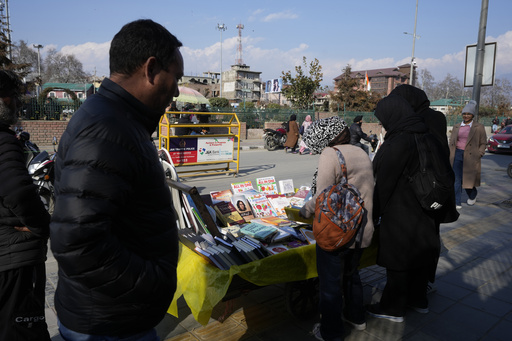
Srinagar, India — Law enforcement in the Indian-administered region of Kashmir recently conducted operations targeting bookstores, resulting in the confiscation of hundreds of literature pieces associated with a prominent Islamic group within the contentious area. These actions come amidst growing restrictions on the media and public expression in the region over recent years.
The operations commenced on a Friday in Srinagar, the main city of the region. According to a post shared by the police on the social media platform X, the authorities based their actions on “credible intelligence regarding the secret sale and distribution of literature promoting the ideology of a banned organization.” A total of 668 books were reportedly seized during these raids.
Booksellers mentioned that most of the confiscated items were published by Markazi Maktaba Islami Publishers from New Delhi, an entity linked to Jamaat-e-Islami Hind, one of the largest Islamic and political organizations in the Indian subcontinent. The Indian government had previously classified Jamaat-e-Islami as an “unlawful association” in Kashmir in February 2019, shortly before revoking the region’s semi-autonomous status in August of the same year. Since then, there has been a marked decrease in dissent, as authorities have maintained stringent controls on public expression to promote what they refer to as “Naya Kashmir,” or a “new Kashmir.”
The bulk of the seized literature consisted of works by Abul Ala Maududi, a significant Islamic scholar from the 20th century who founded Jamaat-e-Islami and advocated for the integration of state and religion. Bookstore owners reported that police came to their shops, demanding the surrender of any Maududi titles and threatened to halt their sale in the future. Responding to the officers, a shop owner pointed out that these books were widely available across India and through online platforms, but the officers ignored his arguments and proceeded to confiscate the books.
Further raids took place in various parts of Kashmir, with police teams conducting rigorous inspections of bookstores “to prevent the circulation of banned literature associated with Jamaat-e-Islami,” as noted in a police statement released on Saturday. The police declared that these books violated legal regulations and affirmed that stringent actions would be taken against anyone found in possession of such materials.
The region of Kashmir is administered in parts by both India and Pakistan, with both nations claiming the entire territory. Since 1989, militants in the area controlled by India have been engaged in a struggle against New Delhi’s governance. Many Muslim Kashmiris resonate with the rebels’ desire to unify the region, either under Pakistani rule or as an independent entity. While India describes the militancy in Kashmir as terrorism sponsored by Pakistan, Islamabad denies these claims, and a considerable number of Kashmiris consider it a legitimate fight for freedom. The prolonged conflict has resulted in the deaths of countless civilians, combatants, and government personnel.
Historically, Jamaat-e-Islami had aligned itself with the armed resistance against Indian authority but shifted its stance in the late 1990s to advocate for political solutions instead. During that time of intense rebellion and counterinsurgency, many Kashmiris faced detention for possessing related literature. Some resorted to disposing of or burying the books to safeguard themselves from anti-rebellion raids.
In a notable incident from 2011, authorities charged educational officials in Kashmir over a first-grade textbook that depicted the term “tyrant” alongside an illustration resembling a police officer. Praveen Donthi, a senior analyst at the International Crisis Group, remarked that the recent actions against literature reflect “naivete” and might inadvertently enhance curiosity among the region’s disillusioned youth regarding the banned texts. Donthi stated, “Finding a digital version of the same material isn’t particularly challenging. At a time when New Delhi is attempting to project an image of normalcy and stability, the optics of this move harm its democratic image.”
The crackdown has drawn widespread condemnation within Kashmir. Several leaders from Jamaat, who recently participated in local elections, labeled the confiscation as “unjust, unconstitutional, and a violation of fundamental rights.” In their statement, they insisted that the seized books were legally published in New Delhi and were distributed lawfully within the region’s bookstores. “If the government has any security concerns, we readily offer to cooperate with any investigation,” the statement concluded.
Mirwaiz Umar Farooq, a significant resistance figure in Kashmir, described the police action as “condemnable” and “ridiculous.” He stated, “The idea of policing thought by seizing books is plainly absurd in an era where information is readily accessible via the internet.”

